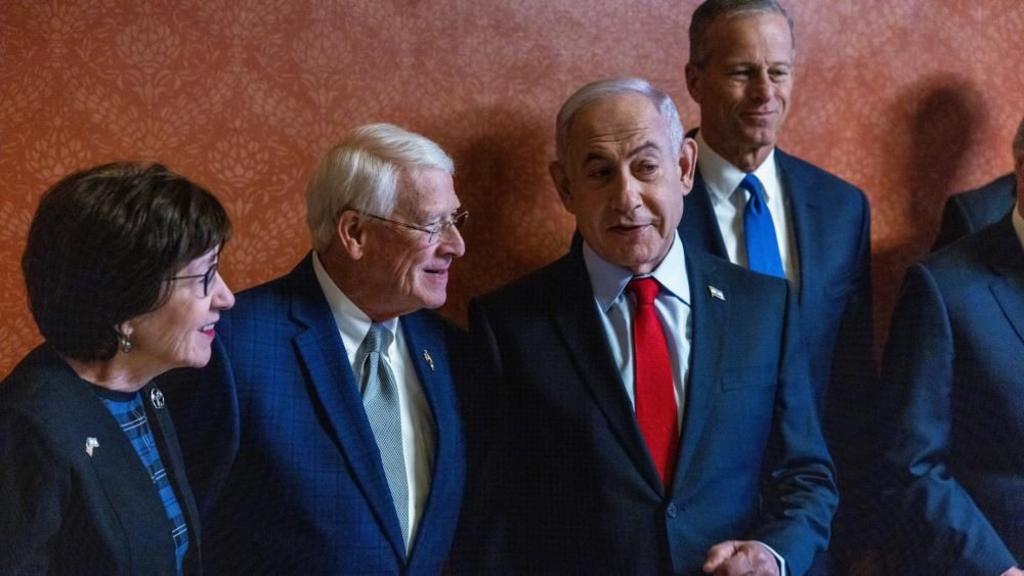Israeli Prime Minister Benjamin Netanyahu visited Washington, D.C., on Thursday, where he met with U.S. lawmakers at the Capitol. His visit follows a recent appearance with former President Donald Trump at the White House, highlighting the ongoing diplomatic ties between Israel and the United States.
This meeting comes at a time of heightened geopolitical tensions, particularly concerning U.S. policy on the Gaza Strip and the International Criminal Court (ICC). President Trump recently signed an executive order imposing sanctions on the ICC for its investigations targeting the United States and allies such as Israel.
Netanyahu’s Visit to the U.S. Capitol
During his visit, Netanyahu engaged with U.S. lawmakers to discuss key regional security concerns and the strategic partnership between Israel and the United States. His discussions likely included U.S. military aid to Israel, the situation in Gaza, and Israel’s response to international legal scrutiny.
This meeting follows Netanyahu’s recent appearance alongside Trump at the White House, underscoring the close alliance between the two leaders and their shared stance on issues such as Iran, Palestinian relations, and the ICC’s legal actions.
Trump’s Executive Order Against the ICC
President Trump recently signed an executive order imposing sanctions on the ICC, a move aimed at protecting American personnel and allies from what the administration perceives as politically motivated investigations. The ICC has been examining potential war crimes involving U.S. forces in Afghanistan and Israeli military actions in Palestinian territories.
The executive order restricts the financial assets of ICC officials involved in such investigations and blocks their entry into the United States. This decision has drawn criticism from human rights organizations, which argue that it undermines international justice efforts.
Trump’s Proposal for Gaza and Global Reactions
Earlier this week, Trump reiterated his controversial plan for a U.S.-led administration of the Gaza Strip, a proposal that has faced widespread rejection from Palestinian leaders and international policymakers. The plan, which suggests that the U.S. could temporarily oversee Gaza’s governance, has been dismissed as impractical and lacking Palestinian representation.
Despite the backlash, Trump did not mention the Gaza proposal during his speeches at two prayer events in Washington, D.C., on Thursday morning. Instead, he emphasized his desire to be seen as a “peacemaker and a unifier,” signaling a broader appeal to his political base.
Other Developments in U.S. Politics
In a separate political development, a U.S. federal judge has temporarily blocked a deadline for federal employees considering a “deferred resignation” offer. According to CBS News, the court’s decision pauses a key component of the administration’s workforce restructuring efforts, though further legal challenges are expected.
Frequently Asked Questions (FAQs)
1. Why did Netanyahu meet with U.S. lawmakers?
Netanyahu’s visit focused on strengthening U.S.-Israel relations, discussing regional security, and addressing concerns over the ICC’s investigations into Israel’s military actions.
2. What are the sanctions imposed on the ICC?
Trump’s executive order freezes the assets of ICC officials involved in investigations against the U.S. and its allies and restricts their travel to the United States.
3. What is Trump’s proposal for the Gaza Strip?
Trump suggested a U.S.-led administration for Gaza, an idea widely rejected by Palestinian leaders and international stakeholders. Critics argue it undermines Palestinian sovereignty.
4. How has the international community responded to the ICC sanctions?
Many human rights groups and European governments have criticized the move, arguing it weakens international accountability mechanisms for war crimes.
5. What is the significance of the judge’s ruling on federal employees?
The ruling temporarily halts a key deadline for federal workers considering voluntary resignations under a restructuring plan, impacting government employment policies.
Conclusion
Netanyahu’s visit to Washington underscores the continued strategic partnership between Israel and the United States amid growing international tensions. Trump’s recent actions—sanctioning the ICC and proposing a new approach to Gaza—have further intensified global debates on U.S. foreign policy. As these developments unfold, their long-term impact on Middle East diplomacy and international legal frameworks remains to be seen.

